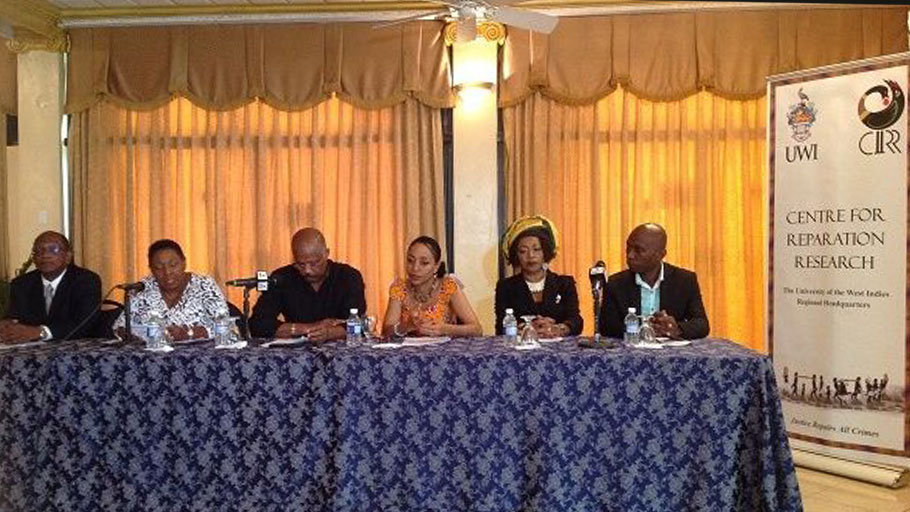Sir Hilary Beckles (third from left) said “the colonial mess left behind… has overwhelmed the efforts… to achieve sustainable economic development”. Photo — Earl Bousquet
By Earl Bousquet —
The global movement for Reparations for Slavery and Native Genocide from Europe and North America gathered in Jamaica between Oct. 10 and 12 for a series of activities that have given much traction to the tri-continental movement. In part two of this special series, Caribbean journalist Earl Bousquet examines onging efforts to “clean up the colonial mess.”
Fifteen former European colonies in the Caribbean are switching gear to speed up their ongoing quest for reparations from imperial and colonial empires. The intention is to clean up the mess left after independence, which benefited from the slave trade built on the backs, blood, sweat and tears of African slaves after colonial forces committed genocide against the native peoples they met on arrival.
The Caribbean Community (CARICOM), representing English-, French-, Spanish- and Dutch-speaking former European colonies ravaged by 400 years of slavery, four years ago agreed to approach the culprit states through the European Union (EU) in a gentlemanly manner.
Seeking dialogue
The CARICOM leaders in 2015 wrote to the leader of each related EU member-state, seeking peaceful dialogue – not confrontation – regarding Reparations for Slavery and Native Genocide.
It was a historic, unprecedented step in which a group of more than a dozen United Nations’ member-states collectively wrote to another world grouping, seeking dialogue over how best to pay the wages of past sins.
But despite officially writing to Britain, France, the Netherlands, Portugal, Spain and the Scandinavian states that built and benefited from West Indian slavery, the CARICOM group has been ignored or blindsided, with the European leaders offering similar arguments against even considering the request for talks.
Governments have changed in Britain and France – the main beneficiaries from slavery in the Caribbean – but the EU is yet to reply, and the new administrations have essentially ignored the inherited correspondence.
Who’s to blame?
CARICOM has not yet decided what its next move will be, but its heads of government are being advised by the main related advisory body to not only switch gears, but also press the accelerator.
The CARICOM Reparations Commission (CRC), established in 2013, held its 10th meeting in Jamaica on October 12, after which it revealed its assessments and conclusions regarding the present state of play.
CRC Chairman Professor Sir Hilary Beckles told a press conference that the commission had assessed that “the colonial mess left behind” in the Caribbean by the European empires built on slavery “has overwhelmed the efforts of the governments and private sector to achieve sustainable economic development.”
Tottering on the brink
For five decades, he noted, successive colonial and independent Caribbean states’ best efforts have only resulted in leaving democratic government “tottering on the brink of fiscal disaster” as a result of “inherited illiteracy, popular ill-health, horrendous community housing, grossly inadequate infrastructure for urban and rural living, general psychic brutalization and a persistent radicalized culture.”
He said the “legacy of unrepaired colonization has rendered Caribbean communities particularly vulnerable, through poverty, to the ravages of natural disasters, as demonstrated by climate-change research.”
Persistent poverty
The CRC chairman pointed to “The refusal of Britain to facilitate the modernization of its former colonies,” saying it is “evidence of its persistent hostile racial attitudes to the impoverished people of the region.”
He also noted how Haiti had been “forced by France to pay reparations” worth 150 million gold francs, resulting in increasing and sustained poverty – simply for having ousted French slave-masters and then freed slaves in the world’s first revolution, leading to a Black Republic in 1804.
A Caribbean Marshall Plan?
He noted that before and following the Marshall Plan launched by the US to rebuild Europe after World War II, West Indian governments and colonial administrators had been calling for a similar plan for the then British and French West Indies, as well as the Dutch Antilles.
Since independence, Sir Hilary told the gathered reporters from the Caribbean and beyond, “Caribbean governments have spent beyond their financial capacity to invest in the democracy the people demanded and idealized, with a view to cleaning up the colonial mess. The effort at self-development, without anything resembling the Marshall Plan they demanded, is in crisis.”
‘No shame’
Professor Beckles pointed out that since independence in the 1960s, Caribbean states have been mired in ever-deeper poverty by the massive investments necessary for health, education and housing, “while Europe, which extracted wealth through native genocide, African enslavement, deceptive indenture, colonialism and racial apartheid, has turned its back on the site of its crimes against humanity.”
With the vast majority of CARICOM member states being former British territories, the CRC chairman noted that “Britain’s imperial policies have kept these societies dependent and backward,” while “France sees no shame in its persistent punishment of Haiti” and “Spain remains in denial of its role as an initiator of these crimes.”
Stretched to the limit
“Caribbean democracy is now stretched to the limit by rising poverty, escalating domestic and international debt that should have been given as grants to aid the quest to clean-up the colonial mess,” he noted.
Based on these analyses, the CRC Chairman said the body had determined that several related issues should be highlighted to the regional and world press for ongoing transmission to Caribbean people at home and abroad, in the diaspora and everywhere else people are interested in the region’s quest for reparations and to clean up the inherited colonial mess.
He concluded that the Caribbean cannot clean it up alone and has every right to seek historical redress through reparatory justice for centuries of slavery preceded by the genocidal extermination of the native peoples met by the European when they came seeking new worlds to conquer.















